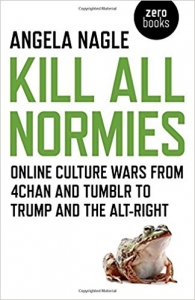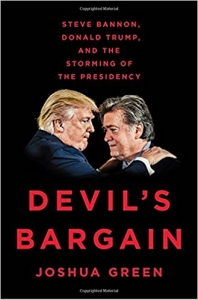 J.A Smith reflects on two recent books that help us to take stock of the election of President Donald Trump as part of the wider rise of the ‘alt-right’, questioning furthermore how the left today might contend with the emergence of those at one time termed ‘a basket of deplorables’.
J.A Smith reflects on two recent books that help us to take stock of the election of President Donald Trump as part of the wider rise of the ‘alt-right’, questioning furthermore how the left today might contend with the emergence of those at one time termed ‘a basket of deplorables’.
Devil’s Bargain: Steve Bannon, Donald Trump and the Storming of the Presidency. Joshua Green. Penguin. 2017.
Kill All Normies: Online Culture Wars from 4chan and Tumblr to Trump and the Alt-Right. Angela Nagle. Zero Books. 2017.
In September last year, Hillary Clinton identified within Donald Trump’s support base a ‘basket of deplorables’, a milieu comprising Trump’s newly appointed campaign executive, the far-right Breitbart News’s Steve Bannon, and the numerous more or less ‘alt right’ celebrity bloggers, men’s rights activists, white supremacists, video-gaming YouTubers and message board-based trolling networks that operated in Breitbart’s orbit. This was a political misstep on a par with putting one’s opponent’s name in a campaign slogan, since those less au fait with this subculture could hear only contempt towards anyone sympathetic to Trump; while those within it wore Clinton’s condemnation as a badge of honour. Bannon himself was insouciant: ‘we polled the race stuff and it doesn’t matter […] It doesn’t move anyone who isn’t already in her camp’.
There is a lot of self-deceit in ‘moderate’ liberal analyses of the beating their politics took on both sides of the Atlantic in 2016, as well as a preference for lurid conspiracy theories over self-criticism. The current Trump-Russia allegations are a case in point. Maybe it’s all true, but impeaching Trump over collusion with Russia during the election would be a total disaster from the point of view of the Democrats. No one who backed Trump is going to think of themselves as having been duped by Russia, and it would allow the Democrats to continue to put all the blame for their original loss to him down to external factors and embark on no analysis as to why what they did offer was so powerfully rejected.
There is a similar danger in discussion of the alt-right of finding in their machinations yet another outside cause to blame. Since the election, a lot has been said about the effect 4chan, the ‘gamergate’ affair and other deplorables had on it: ‘red pilling’ young men out of their liberal-cuck illusions, advising them to conceal their support for Trump so that the polls would be wrong, intimidating Trump’s opponents on social media and spreading algorithm-friendly fake stories about Clinton. But as well as insulating liberals from their own mistakes, attributing too much influence on the election to the alt-right risks taking their self-aggrandising claims at their word.
Taken together, Joshua Green’s Devil’s Bargain: Steve Bannon, Donald Trump and the Storming of the Presidency and Angela Nagle’s Kill All Normies: Online Culture Wars from 4chan and Tumblr to Trump and the Alt-Right help us take stock. Green’s gripping account of Trump and Bannon’s remarkable parallel careers concludes that ‘to understand Trump’s extraordinary rise, you have to go all the way back and begin with Steve Bannon’. To say the least, the inside story of Trump’s campaign – much of the tone and institutional resources of which were brought by Bannon – is a head-spinning account of what is now politically possible, and the alt-right do play an important part. Nagle’s analysis is more cultural, less absorbed with the agency of particular individuals, and also more polemical.
 Image Credit: Trump Alt-Right Supporter, St Paul, Minnesota, 4 March 2017 (Fibonacci Blue CC BY 2.0)
Image Credit: Trump Alt-Right Supporter, St Paul, Minnesota, 4 March 2017 (Fibonacci Blue CC BY 2.0)
For Nagle, the alt-right is the fallout of the anarchic message board culture that thrived in the days of Anonymous, Occupy and Obama’s first term, the culture of which was not then clearly defined and which ‘could have gone another way’. The right-wing stripe it has been allowed to take is, for Nagle, in part the failing of an academic humanities and commentator class, whose habit is to lionise ‘non-conformism’ and ‘subculture’ as such, and so in this case was unable to see its dangers in time. More damningly, Nagle sees it as a dereliction on the part of a left dominated by an inward-looking and backbiting online culture of identity politics, which has made it ill-prepared or unwilling to argue against the ideas of this new right on its preferred online battlegrounds.
A few years before he joined Breitbart, Bannon was in Hong Kong, representing a company that was trying to capitalise on the success of the video game World of Warcraft. In the game, players could win items, such as weapons and gold, to be used in its virtual world. The plan was to employ an army of Chinese workers to continuously play the game, earning this virtual gold so it could be sold to western gamers for real money. Bannon’s job was to get investors for the venture and the game’s manufacturer to approve the practice. The bid was a ridiculous failure: the licence was denied, those suspected of selling or buying virtual gold were booted off the game and the company was met with a class action lawsuit by gamers accusing them of wrecking the game by flooding it with unearned advantages.
But, Green argues, the episode gave Bannon ‘an early understanding of the size and strength of online communities, along with an appreciation for the powerful currents that run just below the surface of the internet’. At Breitbart, Bannon made the internet troll Milo Yiannopoulos – known for his anti-feminism and racist jokes, offset by a flamboyant campness – the site’s tech editor. Yiannopoulos’s output was distinguished from the product reviews and coverage of the business dealings of tech companies found in the conventional tech press by a focus on ‘cultural’ issues close to the hearts of the adolescent male gaming community: fanning the flames of resentment against ‘diversity warriors’ in game design and journalism, advertising online apps to harass feminists and, finally, when Trump announced his candidature in 2015, backing him as the ultimate online troll, and therefore as one of their own.
Trump was exactly the bloated, orange messiah they had been waiting for. If the stereotypical online troll is a poorly-nourished basement-dwelling loser (this stereotype is self-cultivated in message board culture), then such a figure could look on Trump as all that they wanted to be, but also, weirdly, as all that they already were. The holder – like them – of un-PC opinions who rated women out of ten, he was – unlike them – the guy who wanted for nothing, whose consumption of all things was limitless, and so (as he liked to remind the electorate) the guy who couldn’t be bought because his desires were already being constantly fulfilled. At the same time – like them – the diet that Trump turned this limitless consumption to was dominated by junk: coca cola, fast food and steaks always well-done with ketchup: a diet ‘performed’, as it were, in interviews, off-duty selfies and in statements by his spokespeople trying to play up his authenticity.
 Image Credit: (Andrew Moore CC BY SA 2.0)
Image Credit: (Andrew Moore CC BY SA 2.0)
One magus of the alt-right has taken to remarking that Trumpian populist conservatism is ‘the new counter-culture’, ‘the new punk’. Another, Nagle tells us, ‘started out as a scholar of Leo Strauss, Adorno and Wagner’, while Bannon himself, Green shows, anchored his anti-Muslim agenda in early-twentieth-century French occultism and Catholic social thought. And yet, despite this pedigree signalling, one of the curious things about the alt-right is the peculiar shallowness of its cultural production. If this is a counter-culture, where are its short films? Its bands? Its fiction writers? To an outsider it looks like they don’t have anything more than a bunch of YouTube videos of adults talking about computer games, some sexist dating manuals and the guy who draws ‘Dilbert’ on side.
But in a way this disjunction between grand cultural claims and wafer-thin cultural references that don’t go deeper than manga and The Matrix is just another thing the alt-right has in common with the Trump aesthetic. A signature policy (build the wall!) first seen in the satirical portrayal of Republicans in the TV comedy Arrested Development in 2013; an inauguration speech plagiarising The Dark Knight Rises; a series of policies so extreme or incoherent that they could only be turned down by the other arms of state, causing chaos: this is statecraft as trolling, and as over-sugared and over-caffeinated screengrab meme. Bannon and Yiannopoulos were right that the trolls had found their man.
Like the Leave campaign in Britain’s EU referendum and – at the other pole – Momentum’s contribution to Jeremy Corbyn’s remarkable resuscitation of Labour in the UK General Election this year, Trump was able to dominate the campaign’s online battleground for fairly simple reasons. Online campaigns get traction when the politics involved can solicit enough people’s desire in such a way that they want to spend their free time sharing its message, and when doing so makes them feel, on some level, joyously part of a shared endeavour with others. That’s how a political message starts to get a big and – crucially – organic-looking presence online: the shares, the retweets, the likes that get it seen by people who are not already natural supporters. Not everyone in the alt-right’s orbit was uniformly woman-hating, white supremacist, ‘race realist’, anti-Islam, anti-masturbation (!) or whatever, but those who weren’t were sufficiently won over by the parts they did like to overlook those they didn’t, refusing, as Nagle puts it, to ‘punch right’… or at least until the election was over.
Nagle is quite correct that an aspect of the left’s failure to contain the alt-right was its excitement in the days of Occupy that ‘the new public sphere was going to be based on leaderless user-generated social media’: this happened alright, ‘but it has helped to take the right, not the left, to power’. In a sense, the rehabilitation of the traditional ‘party’ model on the left, either in critiques of folk politics by Nick Srnicek and Alex Williams and Jodi Dean, or in its embrace of Corbyn and Bernie Sanders, is an attempt to make amends for this mistake. Nagle is also right that we need to find new ways to debate alt-right arguments. The daily libels against Muslims, immigrants and feminists need to be taken on, but – it should be stressed – in a way that can resonate on the alt-right’s own platforms, even if these people’s ‘ability to send thousands of the most obsessed, unhinged and angry people on the Internet after someone if they dare to speak’ places limitations on who can safely do so.
 Image Credit: Women’s March 2017 (Mark Dixon CC BY 2.0)
Image Credit: Women’s March 2017 (Mark Dixon CC BY 2.0)
The litheness with which we are going to need to approach such ‘debate’ is not, I think, always grasped in Nagle’s book itself. In fact, it is sometimes guilty of making a fetish of free speech and ‘open debate’ in a way eerily resembling the so-called ‘classical liberals’ one encounters in alt-right circles. One of Nagle’s considerable virtues as a cultural critic is a sardonic nonchalance when discussing things that make other writers histrionic (on rehearsing the details of gamergate: ‘one can feel the life draining out of the body at the thought’). But when she turns to the internet subculture she represents as the bête noire and reverse mirror image of the alt-right, the ‘Tumblr liberalism’ of ‘SJW’ intersectional feminists, she strikes, I think, some duff notes.
For Nagle, the online wing of this activist culture might have been well-intentioned in its support for alternative sexual identities and non-‘neurotypical’ types. But the humourlessness with which some of its high-profile members claimed victimhood, or denounced others for not sharing their sometimes considerably avant-garde assumptions, did more – in the balance – to offer ammunition to Tumblr liberalism’s alt-right antagonists than it did to help others. Worse, a culture of ‘no platforming’ and ‘trigger warnings’ in universities insulated young people on the left from ever having to be exposed to ideas that didn’t fit their worldview, stifling debate while surrendering the reputation for openness to new ideas to the right.
Nagle cites some nauseating examples of self-righteous and naval-gazing intra-left campaigns of denouncement. But it seems irresponsible to me to do so without acknowledging how much online intersectional feminism has meaningfully contributed to the discourse around trans rights, disability, sex worker advocacy and race. While Nagle sees the right-wing backlash as proof of failure, we could just as well put it down to the fact that intersectional politics does change things, and that’s very threatening to the right. There is also a danger of creating a false binary between different kinds of leftists. While the Clinton campaign’s simulacrum of Tumblr’s right-on language was – granted – pretty toe-curling, in Britain, the intersectional effects of austerity were constantly stressed as part of the anti-cuts activism in the Coalition years; and these were, in many cases, the very same activists who brought Corbyn to power.
As for no-platforming and trigger warnings, I just don’t buy that these are closing down debate. There is not a limitless programme or budget for guest speakers at universities, and inclusions will always be selective. Students taking more of a role in such decisions – however ham-fisted Nagle shows these interventions to have sometimes been – is a valid part of the democratisation of universities. Besides, making the case that someone has no business having a paid engagement offered to them, when they have shown an unwillingness to budge on an opinion many students find objectionable, can be a valid form of debate in itself. There is no right to a platform, and the loudest yelps of ‘I’m being censored!’ are made from the couch on Newsnight and in columns for the Sunday Times.
When people talk about universities as places of open debate, I think they sometimes misrepresent what typically goes on in them. Debate happens between academics in publications and at conferences, between postgraduates in the pub and between students and their tutors in seminars. But as for an idea being fought over back and forth in front of an audience (which I suppose is what many free speech fundamentalists are imagining), I’m not sure it exists outside the debating societies of Oxbridge, which are nothing more edifying than showing-off exercises for the ambitious.
About trigger warnings, Nagle is frankly callous: she refers to ‘the unexpectedly high number of young women who had never gone to war claiming they had PTSD’. As someone who teaches students who have been victims of sexual violence virtually every year, if I want to teach Salò or Blue Velvet, the students are damn right I should let them know the sort of thing that happens in them before sticking clips into lectures.
It is easy to say that identity politics has failed because Trump is President. But it would be just as easy to claim that untrammelled free speech, satire (God help us) and other institutions of traditional liberal politics have failed on the same grounds. There was a time when mainstream liberals were claiming that, under the scrutiny of the election campaign, Trump’s abhorrence would speak for itself and reason would prevail. (Trump received 15% more media coverage than Clinton did, most of it negative.) The same goes for hosting Yiannopoulos on Bill Maher’s chat show or having Laurie Penny write a feature on him for the Guardian. Maher ended up agreeing with Yiannopoulos, Penny sounded like she was mates with him, and Trump won.
Nagle is perfectly right that the left needs to find new ways to argue, and it’s crucial that she has begun this conversation. But dismissing wholesale the tactics of ‘Tumblr liberals’, while pretending some sort of return to an Enlightenment ideal of open debate is the only legitimate way for this to take place, isn’t going to do the trick.
______
Note: this was originally posted on the LSE Review of Books blog.
 J.A. Smith teaches at Royal Holloway, University of London. His next book is Other People’s Politics: Corbyn and the New Populism. He tweets @NuPopulism. Read more by J.A. Smith.
J.A. Smith teaches at Royal Holloway, University of London. His next book is Other People’s Politics: Corbyn and the New Populism. He tweets @NuPopulism. Read more by J.A. Smith.



 Find these books:
Find these books: 



I think the criticisms lf Nagle don’t hit the mark. I’ll stick to one point-the idea that intersectional left politics hasn’t closed down debate in universities.
“There is not a limitless programme or budget for guest speakers at universities, and inclusions will always be selective. Students taking more of a role in such decisions – however ham-fisted Nagle shows these interventions to have sometimes been – is a valid part of the democratisation of universities. Besides, making the case that someone has no business having a paid engagement offered to them, when they have shown an unwillingness to budge on an opinion many students find objectionable, can be a valid form of debate in itself. There is no right to a platform, and the loudest yelps of ‘I’m being censored!’ are made from the couch on Newsnight and in columns for the Sunday Times.”
This is simply not how it works. Individuals and student societies invite speakers. Other individuals, or university committees, have taken it upon themselves to then police that open process, or to prevent invited speakers from being heard through no platform and disruption.The attempts are not ham fisted but othwise well intentioned. They are attempts to curb freedom of speech on campus. Anyone following the issue ( inc those who agree with limiting FoS) would have to admit there has been a big increase in this on both sides of the Atlantic. The right to speak is not an issue for ‘democratisation’ ( which in this context means the authority of others to decide who an individual can invite and who they can hear) but one of basic rights, without which democracy is diminished.
This issue will grow and grow as the intersectional left increasingly invokes offence as an argument agianst free speech. As Nagle indicates, the tragedy is that it is the Left who are often at the forefront of this, allowing the Right to (falsely) claim the mantle of freedom. The value of Nagle’s argument is she points to the necessity of a radical politics that embraces freedom of speech as well as opposing injustice, that sees individuals with ideas rather than identities defined by their fragility.